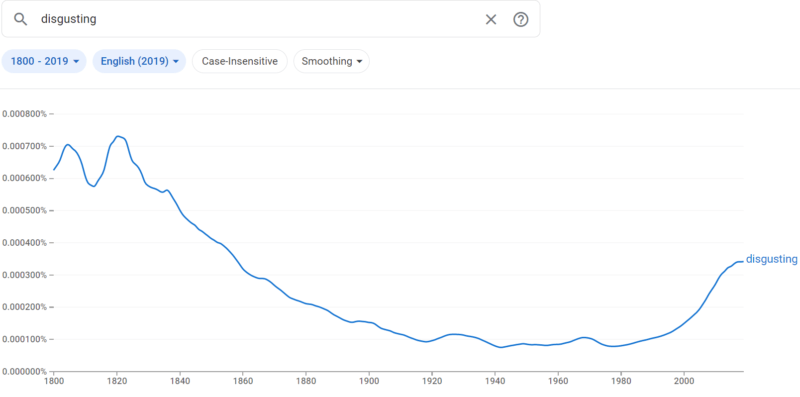That’s Disgusting!

The other day, after several casual conversations and a peek at Tom Fitton’s A Republic Under Assault (p. 34, bottom), it finally hit me. We use the word “disgusting” much more than we used to. Google’s Ngram Viewer verifies my casual observation:

To its credit, the BBC picked up on the disgusting revival of disgust about a decade ago and noted its increasing use in the political sphere, where it is often used to dehumanize opponents by insinuating that they make us want to puke, like a piece of lasagna of dubious provenance found at the back of a not-often-cleaned refrigerator.
Hopefully, disgusting soon will again fall into relative disuse because it portends disunion. That’s because people do not try to reason with disgusting persons or things, they try to get away from them ASAP by any means necessary. According to Charles Darwin and other evolutionary biologists, disgust is a natural, visceral reaction to things that can hurt us (lower our reproductive fitness if you want to get technical), including signs of infection, bodily fluids, dirt, insects, and gross looking, smelling, or tasting food and drink. Scientists have even ranked disgust triggers, which largely transcend cultural differences. Nasty anywhere is pretty much nasty everywhere.
Some disgust triggers, however, are at least partially learned. In 2020, for example, several billion people came to believe that an unmasked stranger’s face is disgusting because it portends death and disease. The human proclivity to avoid diseased people has been called “pathogen disgust.” The concept predates the current pandemic and is a darn tootin’ good reason for governments NOT to impose lockdowns, which are unnecessarily redundant because eons of evolution have primed people to avoid things that might make them sick. I haven’t eaten buffalo cheese dip, for example, since I got sick after eating some in 2005!
In fact, another pre-COVID study found that people in harsher circumstances are more easily disgusted than those living in more stable environments, which suggests that harsh lockdowns exacerbate people’s negative visceral response to non-maskers and other violators of social distancing rules. That, in turn, makes possible stricter police enforcement and more Karenism.
Public policies can become disgusting, too, when they portend death or remind one of feces, as so many seem to do. It therefore isn’t a malapropism or other misusage to state that, say, Trump’s immigration policies were disgusting. Disgusting is, to some extent, in the eye of the beholder and people often engage in hyperbole, labeling something as disgusting to signal their moral virtual. I’ve received praise for positive externalities emanating from my crockpot, for example, until a nosey crackpot learned that the savory smell came from a rabbit I personally shot and prepared for the stew. Suddenly the dish became “disgusting” and myself along with it.
The fundamental problem, though, is that our system of political governance has devolved to the point that disgusting policies become not just possible but probable. America’s original disgusting policy, slavery, fomented disunion. Today, modern forms of slavery, a la Michelle Alexander’s The New Jim Crow, persist, leading in the summer of 2020 to numerous peaceful protests, many riotous urban uprisings, and even a few insurrections (the attempts to overrun the White House, seize a federal courthouse in Portland, and establish autonomous zones).
Unlike in 1861, however, disgusting public policies and proposals abound today because federal and state governments face many fewer de facto checks than they did in the past. In 2020, with a few notable exceptions, governments pretty much did, or didn’t do, what they wanted, when they wanted, to whom they wanted, regardless of the outcome. Disgust with policymakers reached an all-time high, leading to additional protests, riots, and uprisings.
Given the reaction to the recent swarming of the Capitol, most Americans remain more disgusted with the thought of disunion — of breaking the nation into pieces by state or county or creating some sort of “one nation, two systems” solution — than with partisan politics and death-inducing policies like lockdowns and the suboptimal, if not downright irrational, healthcare policies at the root of the nation’s excess mortality in 2020.
How Americans will feel in a year is up to the new administration. If it pretends to possess a mandate to implement sweeping changes that tens of millions of Americans find disgusting, like packing SCOTUS or admitting new states, the nation may be in for another disgusting year. If it follows the conciliatory stance suggested by President Biden in his inauguration speech, however, disgusting thoughts of disunion may dissipate.










